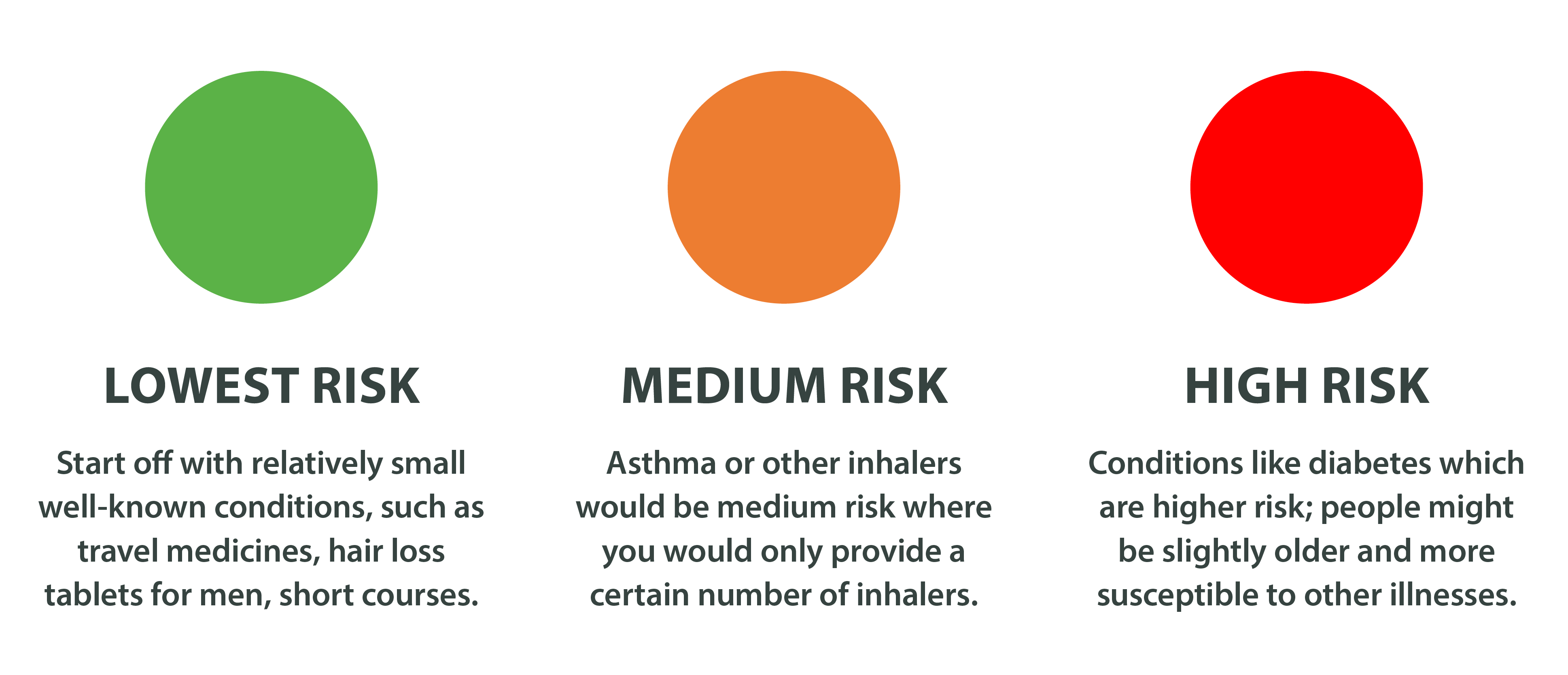Once you have established an online presence for your pharmacy business, you may then decide to offer services or products through your website.
Let’s first look at some of the simple things you can do, starting with adding on services.
Ordering prescriptions online
Getting online means you can start to reproduce many of the services you provide customers in store by providing information in a digital format. For pharmacies in England, one of the easiest first steps is to add a sign-up form for the electronic prescription service (EPS) to your website. By enabling patients to order their prescriptions online, pharmacies can simplify the prescription process and ensure a seamless transition from paper to electronic submissions. This not only streamlines operations but also safeguards against the loss of income due to misplaced paper prescriptions.
There’s a variety of user-friendly apps available, such as EMIS Health’s Patient Access and Healthera, which specifically cater to the needs of independent pharmacies. These apps offer a straightforward way for patients to request repeat prescriptions, which are then processed electronically, ensuring timely delivery of medicines either to the patient’s home or their preferred pharmacy.
It’s all about offering flexibility and convenience to your patients, allowing them to nominate delivery services electronically through widely used apps. By partnering with these apps, pharmacies can focus on providing care without the hassle and complexities of managing the technical aspects, as app providers handle maintenance and updates which significantly simplifies the process.
This digital transition is not just about efficiency; it’s a step towards a more patient-centric service, offering various options to meet the diverse needs of your community.
Providing expert healthcare advice online
Expanding your pharmacy’s online presence to include expert healthcare advice is a straightforward and effective way to enhance your services. It is also a great way to advertise what services you provide, such as special clinics or the Pharmacy First service.
Here’s how you can make the most of it:
Create informative web pages or videos
Consider adding web pages or creating a series of short videos that offer practical advice on:
- Healthy living practices.
- Managing common ailments.
- Correct usage of medical devices, such as inhalers.
These resources can be invaluable additions to your website, providing patients with access to reliable information whenever they need it. For example, filming instructional videos with a mobile phone and uploading them to your site can give patients a useful reference if they forget the advice provided in-store.
Incorporate QR codes on prescription labels
To make this information even more accessible, you could consider printing QR codes on prescription labels. Customers can scan these with their smartphone to directly access the relevant online resources. (This QR code takes you away from the Accord Partner Platform to go to an external site. Accord-UK is not responsible for any content on third party websites.)
Insight:
QR codes are square patterns of machine-readable data. They work similarly to barcodes but can encode much more data which means they are becoming increasingly popular for a wide range of uses. You can buy QR codes online – check out our ‘Useful resources’ at the end of the module
Enabling customers to book services online
The next step up from offering a basic website with health information might be to offer appointments for certain services online, such as:

You can integrate an appointment booking system onto your website, allowing for the easy online booking of popular services. For more personalised services, your site can provide detailed background information and contact forms for arranging further consultations.
Utilising established platforms, such as Patient Access, for booking appointments can streamline operations, as many patients are already familiar with these systems through their GP. This integration not only facilitates easy appointment booking but also ensures that pharmacists have access to necessary training and patient medical records without leaving the pharmacy.
Many potential customers are unaware that their local pharmacy provides so many services. It is important that once you have these services listed on your website you take steps to market them using our advice on search and social.
Insight: Patient Group Directives (PGDs) allow pharmacists to provide a prescription-only medication to specific patient groups for a specific condition without a prescription. If you want to offer flu vaccines, for example, you will need to complete the training for that PGD. You can arrange to only pay for the training you use, so that you and your staff have access to all the training modules, and if you get a booking for a specific service (e.g. a vaccination), you can do the training the day before. If you don’t need the training, you don’t pay for it.
Selling healthcare products and medicines online
The next step up, after offering appointments for services and healthcare advice, is to sell products online.
There are two aspects to this: 1) the technical and logistical requirements, and 2) the regulatory requirements of offering healthcare products online. As we will see, many of the regulatory requirements relate to the technical and logistical requirements. Let’s look at these first.
Technical and Logistical Requirements
- E-commerce platform
Transitioning to online sales requires an e-commerce platform. This might involve investing in a bespoke website design or utilising plug-ins to transform your existing website into an online shop. - Identity verification
For online pharmacies, verifying customer identities and having a registered premises for dispatch are essential. - Customer support
Consider how you will support customers with issues such as delayed or incorrect orders. - Stock management
Effective stockholding management becomes vital as your online presence grows. There are advantages to investing in an online shop: it can help you manage stock more effectively, because you have a more accurate picture of what you’ve sold, which means you can save money by buying more stock at the right times. It can also improve safety, by making it easier to keep an audit trail of how often individual people are repeat buying medicines.
Insight: Starting small and expanding as you become more comfortable can mitigate risks and adapt to demand effectively.
Regulatory Requirements
As a pharmacy, there are four types of products you might consider selling:
- Toiletries and sanitary products
- General sale list (GSL) medicines
- Pharmacy-only medicines (P-medicines)
- Prescription-only medicines (POMs)
Toiletries, sanitary products and GSL medicines
Selling toiletries and GSL medicines is relatively straightforward, adhering to general online sales and data protection laws. However, focusing on niche or local brands can differentiate your pharmacy from larger chains or online competitors.
Pharmacy (P-medicines) & Prescription-Only medicines (POMs)
Once you start to look at selling P-medicines and POMs, then you need to adhere to The General Pharmaceutical Council (GPhC) guidance for distance selling.
- P-medicines: such as emergency contraception or short-course antibiotics for UTIs, are community pharmacy’s specialty, but these require you to ensure that your website operates like a pharmacy.
- POMs – if your online prescribing services employ a listed healthcare professional (i.e. a nurse or doctor, not a pharmacist) then the provision of online services will need to be regulated by the Care Quality Commission (CQC), and their specific guideline. However, if you operate with pharmacy independent prescribers or nurse independent prescribers then the pharmacist prescribers themselves are regulated by the GPhC.
The GPhC provides their own guidance for pharmacy owners on safely and effectively offering pharmacy services online. This guidance is structured around five key principles that define the standards for registered pharmacies. It outlines the standards and requirements for each principle, serving as a comprehensive guide for pharmacies transitioning to online services. You can find a link to the guide in our ‘Useful resources’ at the end of this module.
Insight: Even if your online store is not registered with the CQC, it can also be worth looking at the CQC guidelines for online primary care.
When you’re starting out to develop an online shop, it is worth beginning with low-risk, well known conditions.
Here are some examples of the types of products you could start off with, compared to those that are higher risk and not commonly provided online.

Online pharmacy is mostly focused on lower risk items right now, but as technology advances, it is more likely to be used for these higher risk chronic conditions.
Accreditation of your website and insurance
Under the GPhC guidance, there is certain information you must display on your website.
This includes:
- the pharmacy’s GPhC registration number
- your name as the owner of the registered pharmacy
- the name of the superintendent pharmacist, if there is one
- the name and physical address of the registered pharmacy or any other pharmacies that supply the medicines
- the email address and phone number of the pharmacy
- details of the registered pharmacy where medicines are prepared, assembled, dispensed and labelled for individual patients against prescriptions (if any of these happen at a pharmacy different from that supplying the medicines)
- information about how to check the registration status of the pharmacy – and the superintendent pharmacist, if there is one
- details of how users of pharmacy services can give feedback and raise concerns
Insight: Online pharmacies in Northern Ireland1 must adhere to specific regulatory requirements – they must be registered with the Medicines and Healthcare products Regulatory Agency (MHRA). The EU common ‘Distance Selling’ logo must be displayed on every page of their website where medicines are offered for sale. [For additional information, please refer to the ‘Useful Resources’ section at the bottom of this document.]
The GPhC also operates a voluntary internet pharmacy logo scheme to reassure patients that they are purchasing medicines online from registered pharmacies.
- This logo links directly to the pharmacy’s GPhC register entry.
- The voluntary internet pharmacy logo scheme is unaffected by Brexit.
- The GPhC logo is to be used exclusively on the pharmacy’s own website, with no third-party usage allowed.
- You can find more information on the GPhC – please see the ‘Useful resources’ section below
If you are a member of the National Pharmacy Association (NPA) you can call them to ensure you are fully covered by any additional insurance for providing services at a distance.
1) From 1 January 2021 Great Britain (England, Wales and Scotland) based online sellers are no longer required to display the EU common logo (in the UK known as the Distance selling Logo).
Useful Resources
- Emis Health Patient Access
- Healthera
- QRtiger
- General Pharmaceutical Council – Standards for registered pharmacies
- General Pharmaceutical Council – Conditions of use for the GPhC voluntary internet pharmacy logo
- Care Quality Commission
- MHRA Distant Selling Logo (NI only)
- National Pharmacy Association
References
- Techradarpro, 2020. QR codes finally find their groove during the pandemic. (Accessed June 2024)
- General Pharmaceutical Council, 2019. Guidance for registered pharmacies providing pharmacy services at a distance, including on the internet (Accessed June 2024)
- NHS Digital, 2020. Identity Verification and Authentication Standard for Digital Health and Care Services (Accessed June 2024)
- Care Quality Commission, Additional prompts for online healthcare providers of primary care (Accessed June 2024)



